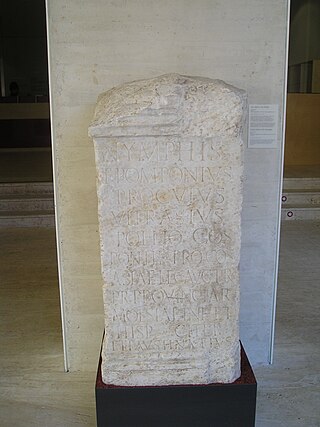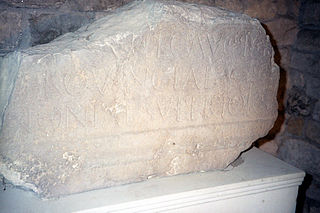
Titus Pomponius Proculus Vitrasius Pollio was a Roman senator, who held several imperial appointments during the reign of Marcus Aurelius. He was suffect consul in an undetermined nundinium around 151; he was a consul ordinarius in the year 176 with Marcus Flavius Aper as his colleague.
Gaius Curtius Justus was a Roman senator who held several posts in the emperor's service during the Antonine dynasty. He was suffect consul in 150 with Gaius Julius Julianus as his colleague. Justus is known primarily through surviving inscriptions, although he could be identical with the Curtius Justus mentioned as a scriptor rei rusticae by Gargilius Martialis (2.1.4,7).
Lucius Dasumius Tullius Tuscus was a Roman senator who was an amici or trusted advisor of the emperors Antoninus Pius and Marcus Aurelius. He was suffect consul in the nundinium of April to June 152 AD as the colleague of Publius Sufenas.
Marcus Nonius Mucianus was a Roman senator who was active in the second century. He was suffect consul in the nundinium of October-December 138 as the colleague of Publius Cassius Secundus.
Marcus Peducaeus Stloga Priscinus was a Roman senator active during the middle of the second century AD. He was ordinary consul for 141 as the colleague of Titus Hoenius Severus. An inscription from the Great Theatre at Ephesus mentions a Marcus Peducaeus Priscinus as proconsular governor of Asia in 155/156, whom professor Géza Alföldy, amongst others, has identified as this Priscinus. Priscinus is known only through surviving inscriptions.
Lucius Novius Crispinus Martialis Saturninus was a Roman senator of the second century. He was suffect consul in either 150 or 151 AD. His life is primarily known from inscriptions.
Marcus Pontius Laelianus Larcius Sabinus was a Roman senator and general who held a series of offices in the emperor's service. He was suffect consul for the nundinium of July-August 145 as the colleague of Quintus Mustius Priscus. Laelianus is primarily known through inscriptions.
Gaius Arrius Antoninus was a Roman senator and jurist active in the last half of the second century AD, who held a number of offices in the emperor's service. The date when he was suffect consul is not attested, but has been estimated to be around AD 173. Edward Champlin includes him, along with Gaius Aufidius Victorinus and Tiberius Claudius Julianus, as "marked out as a special intimate of Fronto's." Champlin notes that while Victorinus received five of the surviving letters of the rhetor Fronto, "as the beloved pupil and son-in-law", Antoninus received four, taking "the place of Fronto's son."
Quintus Camurius Numisius Junior was a Roman senator active during the later second century AD. He was suffect consul for a nundinium in the first half of the year 161 as the colleague of Marcus Annius Libo.
Quintus Cornelius Quadratus was a Roman senator who held a number of offices in the emperor's service. He served as suffect consul for the nundinium July-September 147 as the colleague of Cupressenus Gallus. Quadratus is best known as the brother of the orator Marcus Cornelius Fronto. He is mentioned four times in the surviving correspondence of the orator.
Lucius Pullaienus Gargilius Antiquus was a Roman senator, who held a number of offices in the imperial service during the reign of Antoninus Pius. He is known to have been a suffect consul in the early years of the reign of Marcus Aurelius, most likely in the year 162. He is known entirely from inscriptions.
Publius Vigellius Saturninus was a Roman senator, who was active during the reign of Marcus Aurelius. He is best known as the official who presided at the trial of the Scillitan Martyrs, dated to 17 July 180.
Titus Vitrasius Pollio was a Roman senator, who held a number of offices in the imperial service. He was suffect consul around the year 137.
Quintus Voconius Saxa Fidus was a Roman senator, who was active during middle of the second century. He was suffect consul in the nundinium September-October 146 with Gaius Annianus Verus as his colleague. He is known almost entirely from inscriptions; Voconius is mentioned once in Ulpian's Liber octavus de officio proconsulis.
Lucius Sergius Paullus was a Roman senator, who was active during the reign of Marcus Aurelius. He was twice consul: the first time attested 23 September of an unknown year as suffect consul with [? Lucius Nonius Calpurnius] Torquatus Asprenas as his colleague; and as consul ordinarius for 168 as the colleague of Lucius Venuleius Apronianus Octavius Priscus.

Titus Caesernius Statianus was a Roman senator who held a number of appointments in the Imperial service during the reigns of Hadrian and Antoninus Pius. He was suffect consul in the nundinium of September-October 141; his colleague's name is not known. His full name is Titus Caesernius Statius Quinctius Statianus Memmius Macrinus.
Quintus Caecilius Marcellus Dentilianus was a Roman senator, who held several imperial appointments during the reign of Antoninus Pius. He was suffect consul in an undetermined nundinium around AD 150. He is known entirely from inscriptions.
Marcus Servilius Fabianus Maximus was a Roman senator, who was active during the reigns of Antoninus Pius and Marcus Aurelius. He was suffect consul in a nundinium in mid-158 with Quintus Jallius Bassus as his colleague. A native of North Africa, Maximus was the younger brother of Marcus Servilius Silanus, suffect consul in 152, and a relative of Quintus Servilius Pudens, brother-in-law of emperor Lucius Verus.
Marcus Cominius Secundus was a Roman senator, who was active during the reign of Marcus Aurelius. He was suffect consul in one of the later nundinia of 151 with Lucius Attidius Cornelianus as his colleague. He is known from inscriptions and military diplomas issued during his time.

The gens Iallia was an obscure plebeian family at ancient Rome. Members of this gens are not mentioned in ancient writers, but they rose to prominence during the middle part of the second century, with two of them achieving the consulship under Antoninus Pius.



